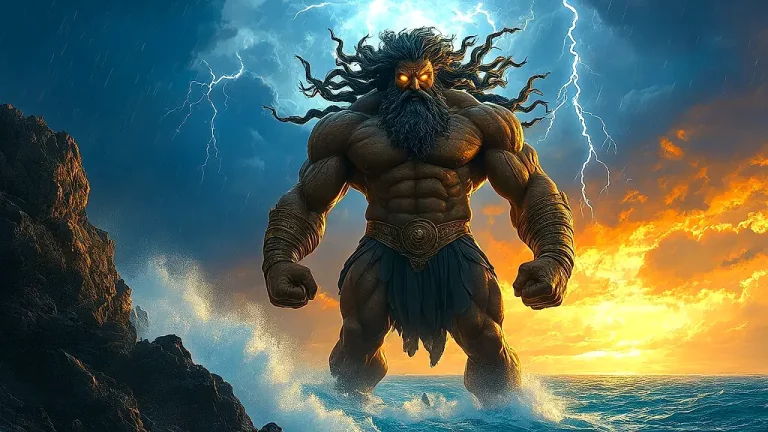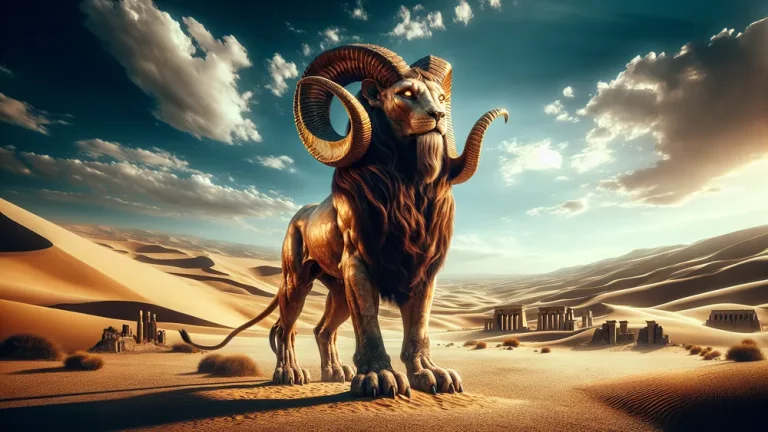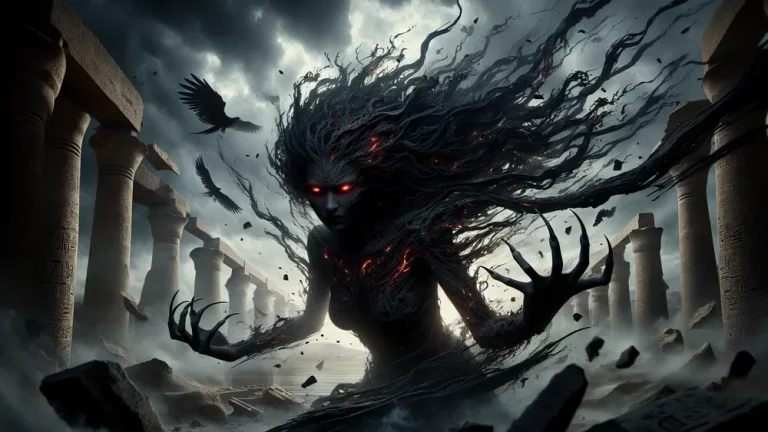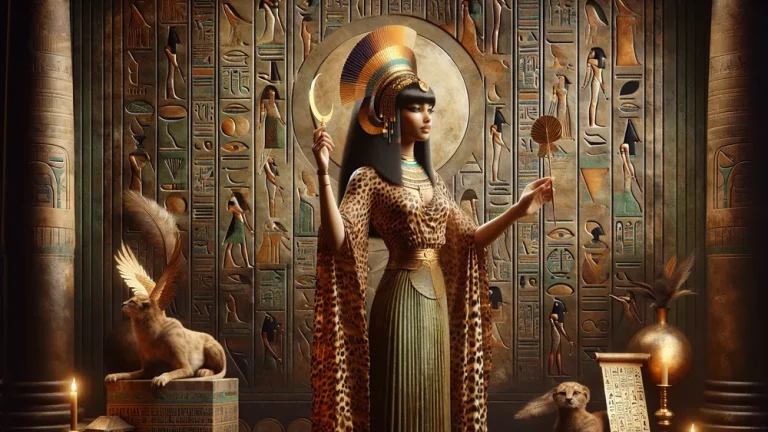Dike: Greek Goddess Of Justice And Moral Order
In the rich mixture of Greek mythology, where gods and goddesses represent various parts of human life, Dike appears as the divine form of justice and moral order. When you look at what Dike does, you enter an area where cosmic balance and ethical action are nicely mixed together, a notion valued by the ancient Greeks who respected her.
Key Points:
- Dike is the Greek goddess of fairness and moral order, tied to justice.
- She is the daughter of Zeus and Themis and part of the Horae with sisters Eunomia and Eirene.
- Her symbols are scales, a sword, and sometimes a blindfold, meaning balance and fairness.
- Stories like the Iliad and Odyssey have her part in themes of fairness and moral lessons.
- Ancient Greeks respected her through rituals and altars in places linked with justice.
- Dike differs from her Roman equivalent Justitia by focusing more on moral order.
- Her role supports justice, guiding both gods and humans towards doing what is right.
In myths, Dike is seen as one of the important Horae, a group of goddesses given the duty of seasons and natural order, making her key in keeping cosmic balance. Her family ties, since she is the daughter of Zeus and Themis, mean she’s clearly tied to justice and divine law.
As we move on, it’s known that we will find out about the family who adds to her role, the symbols that make her stand out, and how all these parts together tell us where she fits in the Greek pantheon.
Dike: Overview and Key Facts
| Key Aspect | Details |
|---|---|
| Name | Dike |
| Domain | Goddess of fairness and doing what’s right |
| Parentage | With Zeus as the king of the gods and Themis as the titan of laws, they are her parents |
| Sibling Relations | Part of the Horae, with sisters like Eunomia who handles laws, and Eirene who looks after peace |
| Symbols | Uses scales, a sword, and sometimes a blindfold, these mean fairness and being balanced |
| Role in Greek Mythology | Keeps divine fairness and makes sure people and gods follow rules |
| Historical Worship | In ancient Greece, people respected her through ceremonies, and there were temples built for her ideals |
| Cultural Influence | Her impact on culture can be seen in Greek rules and morals, also in their art and writings |
| Associated Myths | Seen in stories like the Iliad and Odyssey, where she plays a part in stories about being fair |
| Roman Equivalent | Justitia is what they called her in Rome, having a similar job in their myths as fairness in human form |
What’s Dike All About in Greek Mythology?
To begin with, how about we learn more about Dike in Greek Mythology. We should think about her origins and examine her family ties, and understand the important role that she fills among the Horae.
Where Dike Comes From and Her Family Ties
Dike’s roots in Greek mythology link to a well-known background because she is the daughter of Zeus, the king of gods, and Themis, who deeply represents divine laws. Among the Horae is Dike, one part of a trio of goddesses with her sisters: Eunomia, managing laws, and Eirene, standing for peace.

This family group, where each has a unique and important role, works together to keep things peaceful and balanced. The Horae are daughters of Zeus and Themis, and they are important in maintaining justice in both godly and human worlds. Interestingly, people see Dike as a guardian of justice, showing the ancient respect for laws and what’s right.
Dike, known from Greek mythology, is the daughter of Zeus and Themis, and is part of a set of goddesses who help keep peace and justice in both the world of the gods and humans.
Why Dike Matters as One of the Horae
The Horae in Greek mythology not only stand for time and seasons’ order but also mean justice and harmony in the world. Dike holds an important position, ensuring that justice prevails among not just people but also gods. Different from her sisters Eunomia and Eirene, associated more with laws and peace, Dike’s role involves focusing on the ethical parts of fairness.
It’s not just about applying rules, but pointing moral directions. Much like being the main part of a court, she means fairness is real. Her place with the Horae shows an idea of natural justice, a part of the universe, guiding actions and results. In myths, there are times when Dike is an intermediary between what gods want and human actions.
People see her as watching over human conduct, ensuring accountability when divine rules are broken. This job signifies how the ancient Greeks valued moral order and ethical control, principles Dike often means to uphold. She is known by these values, stopping disorder and chaos, reaffirming Greeks’ beliefs in justice as crucial for balance.
Her guardian-like role makes her a stable force in their world, with her influence echoing in their thoughts on laws and ethics.
What Dike Stands For and How She’s Portrayed
Dike in Greek mythology is an example of fair judgment and clear moral direction, leading both people and gods toward doing what’s right. In essence, justice is important for keeping social and cosmic order, and Dike often appears with this focus. To make sense of what she does, picture Dike holding scales; it means her job is to balance actions and consequences fairly. Often pictured with certain symbols, she has a divine duty:
- Scales: These mean balance and justice.
- Sword: It stands for her power to make right decisions.
- Blindfold: Sometimes it is there, meaning being fair and not seeing who people are, though it is more modern.
These symbols mean she always aims for justice, guiding and reprimanding to keep moral order across all areas. Her image as a watchful leader means the ancient Greeks valued fairness and accountability a lot.
Stories and Legends with Dike
Now, let’s look at the important role and strong moves Dike makes, which became part of many lasting stories in mythology.
Dike’s Role in Epic Tales Like the Iliad and Odyssey
In the epic story of the “Iliad,” Dike’s important part of justice can be seen, making sure fairness stayed even with war chaos. Even though not in the center, we see her presence in themes of moral lessons and payback throughout the tale. Look at how fights and problems are fixed, whether the gods help directly or people learn lessons over time.
Dike’s impact is an example of moral and judicial order, showing what is right in both godly and human worlds. Her role means trusting that fair things happen, acting like a referee in the story. Similarly, though not directly named, Dike’s spirit fills the “Odyssey,” with actions and justice repeating clearly.
The epic follows Odysseus on a tough trip home, where constant tests measure what characters are made of against justice. These stories mean Dike’s judicial oversight is like an unseen judge checking the hero’s actions. Odysseus’s cleverness and toughness are always judged by his justice and ethical ways.
Here, Dike’s idea reminds us of constant moral checks in myths, showing that justice is always there and matters everywhere.
Dike’s Adventures on Earth
In Greek mythology tales, stories say Dike came down from her home in the sky to watch over justice among people, acting like a guide. An important story means her coming during the Silver Age, as per Hesiod, where she walked the earth with humans moving away from doing right. On earth, what was her focus? Guiding and correcting humans to stay on good paths. Her goal?
Justice. Think of it like a teacher stepping in to set students straight. That’s how her presence was meant to bring back moral compasses that had gone off course, though stories differ, changing some small bits of her acts. Direct meetings between Dike and people aren’t detailed a lot in classical stories, but her impact is clear in many moral tales.
For example, the Greeks saw her as someone who would tell Zeus, her father, about human wrongs, leading to godly punishment. Here, Dike acts like a watcher, kind of like a whistleblower. Reports to Zeus: “This is wrong,” so integrity and fairness stay.
The idea of divine justice correcting earth’s errors reveals Greeks believed that bad or good actions don’t go unseen, taught in stories where she intervened on earth. Moreover, stories tell of her leaving the earth in the bad Iron Age when people ignored her warnings and chose wrong ways.
Her leaving shows less justice in a chaos-filled world, a sharp reminder of what happens when morals get ignored. Not just a missing heavenly figure, her going is a warning showing the ongoing fight between order and disorder. It’s a theme in many myths, where gods try to help but people make mistakes, and her goodbye teaches about the link between divine justice and human morality.
In Greek mythology, Dike descended from the sky to serve as a guide for justice among humans, reporting their wrongdoings to Zeus and leaving when morals were ignored during the Iron Age, emphasizing the struggle between order and chaos.
Honoring Dike and Her Temples
When Dike’s effect reached from the sky to the world of people, ancient Greeks showed respect for her lasting energy and promise of justice. They did this with worship and rituals.
Where People Worshipped Dike
In the old Greek world, people mainly respected Dike at spots where the idea of justice could be thought about by everyone. Temples and altars, not as large as those for bigger gods, still had a place in worship. They are like law places now, like courthouses of fairness. Even though not many temples are known just for Dike, she often appeared with others like her mother, Themis, to keep the universal balance.
Rituals held here helped Greeks live by fair rules, which Dike stood for.
To know more about where Dike and how Greeks respected her, think about her part in bigger Greek religious life. Places like Athens, known for thinking about justice, probably had altars for people to do rituals, asking for Dike’s guidance in city life. These spots were not grand shows but kept the balance between divine rules and what people did. Here’s a table with important places connected to justice gods like Dike:
| Location | Worship Element | Historical Significance |
|---|---|---|
| Athens | Altars for Themis and her children | Symbol of democratic ideas, justice in community and rule |
| Argos | Shared spaces with Themis and Nemeses | Meant the tie of justice and payback in moral order |
| Ancient Courthouses | Justice pictures and signs | Places where Dike’s spirit was called to help decisions |
Through these places and rituals, the Greeks meant to stick with the ideas Dike held, mixing divine justice with their daily life.
Celebrations and Ceremonies for Dike
Respect for Dike, while not as widely known as for other big gods, had events meaning the community wanted justice and honesty. These happenings were likely simpler than big festivals, focused on thoughtfulness and community peace, similar to today’s special thought days like National Days of Prayer or Law Day, where justice and ethics are the main focus.
Ancient Greeks offered things and said prayers for Dike, asking for her help to keep fair and balanced dealings in their lives. Though not common, these gathered events often happened with public moments, like courts or town gatherings, maybe including prayers to Dike to keep results true and rightful.

By including Dike in rituals, people back then wanted to keep the idea that someone watching from above was important for keeping society’s laws and rules.
How Dike Stacks Up Against Other Justice Gods
Although the events highlight Dike’s important part in ancient life, it’s interesting to see how she matches with other justice gods from Greek stories and outside them.
Dike vs. Themis: The Family Justice Team
In their stories, Dike and her mom Themis are a strong team in managing justice and order, and they represent different parts of this important society support. Themis, known to stand for divine law, is about social conduct tied to nature’s rules. Often seen as wise, she keeps basic decrees that cosmos and people must follow.
Here, Dike, her daughter, takes on the more human side of fairness, focusing on judgments and keeping justice among humans. If we think of today’s systems, imagine Themis as set laws, the rules made clear, while Dike works to keep these laws active and fair among people. Furthermore, Dike and Themis mean the link between divine rules and their real-world use.

While Themis has a royal-like power over divine law, guiding even the gods like Zeus as a prophet, afterward, Dike, as the order enforcer for humans, solves arguments and stands for fairness and balance. Their actions are tied together, showing how unchanging nature’s rules help establish order in daily life decisions.
This pairing means justice in old Greece wasn’t just an idea for gods, but a real action paired deeply with people’s lives.
Dike and Nemesia: Balancing Justice and Payback
In Greek stories, Dike as the idea of justice matches with Nemesia, the goddess who represents fair payback or ‘the one who gives what is owed.’ Dike, she stands for fairness and the balance maintained by following rules. Meanwhile, Nemesia, she makes sure wrongdoings, like pride or misconduct, do not get ignored, handing out consequences that fit the actions taken.

This setup helps us see modern thoughts about justice and consequences – where justice keeps laws fair and right, while payback means any breaking of rules is met with deserved outcomes. For instance, consider how a court system (Dike) makes the laws clear and decides the honest result, but the punishment system (Nemesia) ensures these results are followed for breaking rules.
In Greek myths, these two deities work together as a self-regulating system of fairness and response, showing how ancient people understood that justice needed to be both fair and ready to act to keep society smooth and peaceful.
The Pantheon of Greek Mythology
Greek stories are a rich mix of tales mixed with a complex set of gods, where each one stands for different parts of life and the universe. At the center, the Greek gods are like a big group where each has a special part in the main story of the world in old times.
From the strong Olympians such as Zeus and Hera to those who are less known, this group covers many characters, meaning everything from love and conflict to the seasons and water. Moreover, to learn more about these interesting figures, you can look at the full list with all Greek Gods and get to know each god’s unique influence and past.
FAQs
1. What are some famous artworks depicting Dike?
Some famous artworks depicting Dike include the relief on the Pergamon Altar, which artistically portrays her role in Greek mythology.
How Dike differs from Roman counterparts like Justitia is primarily in her emphasis on moral order within the community context, while Justitia is more focused on the abstract concept of legal justice.
3. What lessons does Dike impart in ancient myths?
Lessons that Dike imparts in ancient myths revolve around the importance of maintaining justice and moral order, illustrating that upholding fairness is crucial for harmony among gods and humans.
4. Are there any modern-day practices inspired by Dike?
Modern-day practices inspired by Dike often manifest in the form of legal systems and social justice movements that emphasize fairness and equality.







